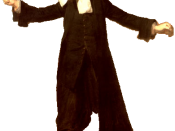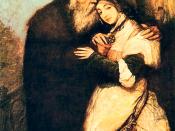The purpose of this essay is to discuss the two views of Shylock in The Merchant of Venice. He was seen as both a victim and a villain "ÃÂ two quite different views "ÃÂ and they will be explored throughout my essay.
Life was not easy being a Jew. Shylock's treatment by Christians was typical of that suffered by Jews over the centuries. He suffered constant verbal abuse, such as "ÃÂmisbeliever, cut-throat dog' (Act 1 Scene 3) and "ÃÂO, be thou damned, inexecrable dog' (Act 4 Scene 1). He was also treated badly and spat upon in public by the Christian Antonio. Shylock was called evil and the devil. He didn't have many friends, and the Christians should've treated him with some respect. Because he is a Jew, law forbids him to belong to any other profession besides money lending. He is hated because of this, which is cruel because he has no choice.
Shylock was judged wrongly just because he was a Jew.
Shylock chose money over his family. He did not share his love with his daughter Jessica, even though she was his own flesh and blood. He calls out to her like a servant, commands her to lock up after he leaves, and says she must stay away from all Christians. Shylock was over concerned about the market place and that his competition was injuring his business. He couldn't stand that someone was denouncing the rate of interest he charged, or that he was lending out money freely. Jessica states "ÃÂI'm not sorry that I will leave my father, our house is hell' (Act 2 Scene 3), indicating that Shylock was like a "ÃÂdevil'. When Jessica ran away from her father to be with her lover Lorenzo, she even stole money and jewels from Shylock. Shylock's love of money was a reason why he was a bad father. He would rather dream of moneybags than his own daughter.
Murder was on Shylock's mind. When an enemy of Shylock's (Antonio) wanted to borrow 3,000 ducats, Shylock set up a bond in case the money wasn't repaid on time. It stated that if the ducats weren't repaid, Shylock could an equal pound of Antonio's flesh from wherever he pleases. This makes Shylock's motive for the bond as murder. By murdering Antonio, Shylock will have gotten his revenge and be rid of a business rival. Antonio gladly accepted the bond, but when he discovers that his he will not be able to repay the bond on time, he pleads with Shylock for some extra time. But Shylock refuses. Antonio's friend offered Shylock six times the amount, but Shylock simply replied "ÃÂI only want my bond' (Act 3 Scene 3). Both the Solicitor and the Duke asked Shylock to show mercy on Antonio, but he refused again. Shylock obviously wanted nothing but revenge on Antonio.
Shylock was made to suffer at the end of the court case. All he really wanted from the court was justice, which of course he did not get. At the court case he was about to take what was rightfully his when the solicitor stated that if he shed a single drop of blood, he would lose all his land. So Shylock withdrawals from the case. But then the solicitor announces that if a foreigner plots to kill a Venetian, the punishment by law it is the confiscation of all his wealth and possible execution. The law takes away both his wealth and his religion "ÃÂ "ÃÂfine half his goods and he immediately must turn Christian' (Act 4 Scene 1). Shylock is forced to kneel on the ground before the court and has no choice but to accept these conditions.
What I conclude about the two portrayals of Shylock is that he is both a victim and a villain. Whilst the harsh treatment as a Jew and the suffering at the end of the court case leans towards being a victim, the plan of murder and the preference of money over his daughter equals the scales.


